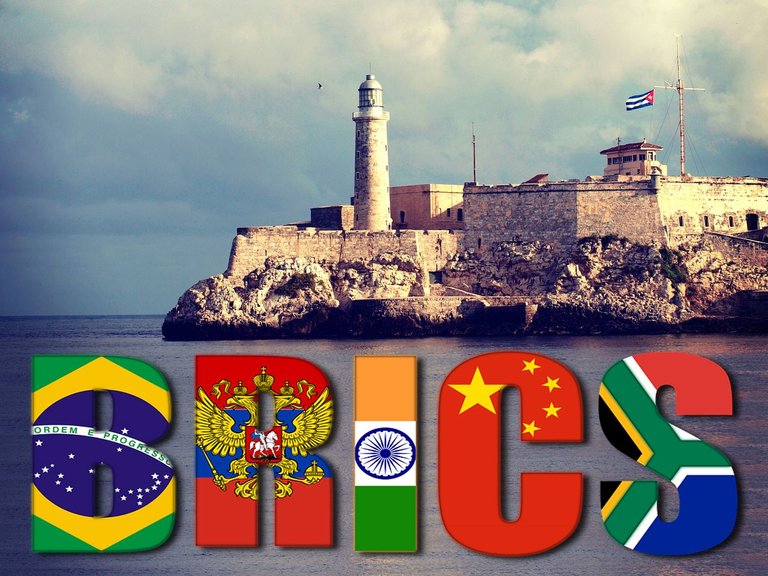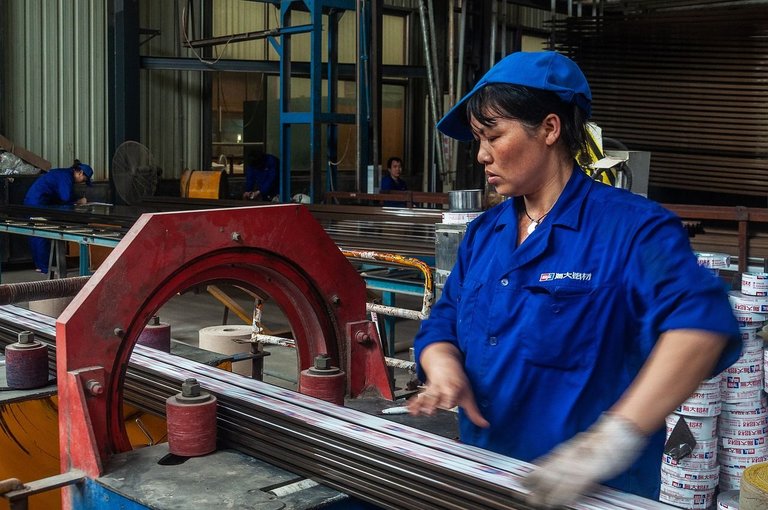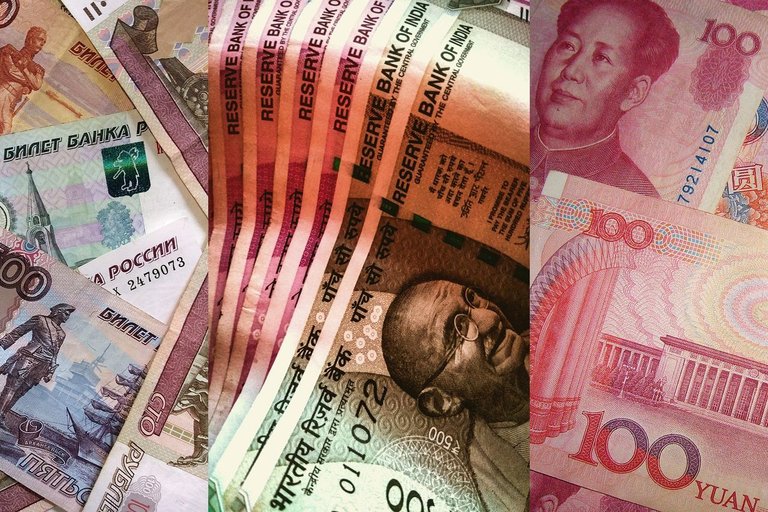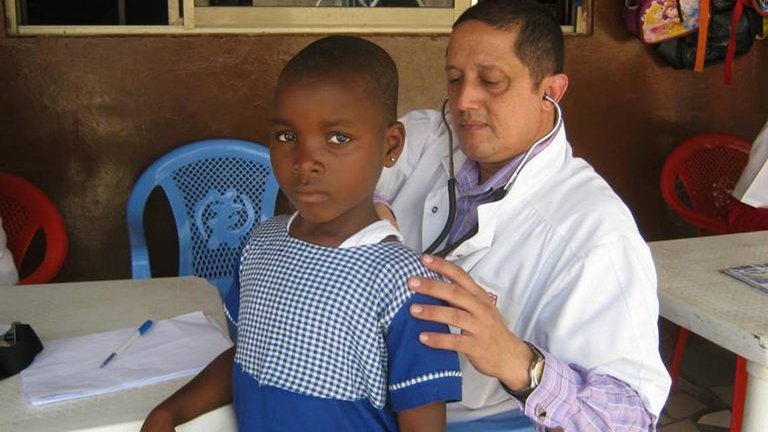
Imágenes de Gordon Johnson en Pixabay / katyocana79 en Pixabay

Me gusta escribir sobre temas referentes a la economía. Ya he compartido antes en este canal publicaciones de esa naturaleza. Lo hago desde mi visión de ciudadano de a pie, desconocedor de muchas aristas que dominan los analistas profesionales de este campo. Por eso, lo que escribo se parece más a la conversación en la cola del pan, que al debate de especialistas sobre la economía.
En estos meses finales del año, el tema Cuba en los medios, ha estado relacionado con noticias negativas. Es lamentable que últimamente esto se haya convertido en norma. Hemos tenido desde desastres naturales, caídas del sistema eléctrico en el país, desabastecimientos de todo tipo, inflación galopante, emigración sin precedentes; hasta lo que se nos viene encima con la reelección de Trump, que ya nos hizo un spoiler, en su primera temporada como inquilino de la casa Blanca.
Sin embargo, la más reciente cumbre de los BRICS, en Kazán, se hizo eco de una buena nueva para nuestro país que ha pasado casi inadvertida tanto para los analistas profesionales, como para los de la cola del pan. Tan es así que, entre nosotros, muchos ni siquiera conocen la existencia de un grupo con ese nombre, y menos aún, quienes lo integran. La noticia en cuestión tiene que ver con la aceptación de Cuba como miembro asociado de los BRICS, junto a otros países como Turquía, Argelia o Vietnam.

English Version
Cuba, an anachronism within the BRICS?
I like to write about topics related to the economy. I have shared publications of this nature on this channel before. Furthermore, I do it from my point of view as an ordinary citizen, unaware of many issues that professional analysts in this field dominate. Therefore, what I write, is more like a conversation in the bread line, rather than a specialist debate on the economy.
In these final months of the year, the topic Cuba in the media has been related to negative news. It is unfortunate that lately this has become the norm. We have had everything from natural disasters, power outages in the country, shortages of all kinds, galloping inflation, unprecedented emigration; to what the reelection of Trump will bring us, who already made us a spoiler, with his first season as tenant of the White House.
However, the most recent BRICS summit, in Kazan, echoed the good news for our country that has gone almost unnoticed by both professional analysts, as well as those at the bread line. So much so that, among us, many do not even know the existence of a group with that name, let alone those who are part of it. The news in question has to do with the acceptance of Cuba as an associate member of the BRICS, together with other countries such as Turkey, Algeria or Vietnam.

Imagen de 勇峰 廖 en Pixabay

Los BRICS fueron fundados por 5 países con economías llamadas emergentes, que acumulan entre todos cerca de un tercio del PIB mundial y casi la mitad de la población del planeta. A inicios del 2024 se ampliaron con la incorporación de nuevos miembros (BRICS+). La cumbre de Kazán, en octubre de este año, les abrió las puertas a otras naciones interesadas en obtener su membresía. Este fue el escenario en que se formalizó la unión de Cuba al grupo.
Sé que lo primero que a muchos de ustedes (me incluyo) se preguntarán ante dicha integración es, ¿qué podemos nosotros aportar al grupo? Si la conversación se diera en la cola del pan, entonces la pregunta sonará algo así como, ¿qué coño pinta Cuba ahí? Si queremos encontrar la justificación de nuestra membresía, creo que la respuesta hay que buscarla en la integración sur-sur, que fomenta el grupo.
Teniendo en cuenta la situación de crisis en que se ha sumergido el país después de la pandemia, los apretones que el anterior gobierno de Trump le dio a la vieja tuerca y los errores en la implementación de medidas económicas internas; el acercamiento a los BRICS pudiera significar la luz al final del túnel. Claro, todo esto pasa por la efectividad real de dicha integración. Si estamos asistiendo a una de las tantas agrupaciones formales, a las que ya pertenecemos, veremos más de lo mismo.

English Version
The BRICS were founded by 5 countries with so-called emerging economies, which together account for nearly a third of the world's GDP and almost half of the world's population. At the beginning of 2024, they were enlarged with the addition of new members (BRICS+). The Kazan summit in October of this year opened the doors to other nations interested in becoming members. This was the scenario in which Cuba's joining to the group was formalized.
I know that the first thing that many of you (including myself) will ask yourselves in the face of this integration is, what can we contribute to the group? If the conversation were to take place in the bread line, then the question would sound something like, what the fuck is Cuba doing there? If we want to find the justification for our membership, I think the answer is to be found in the south-south integration that the group promotes.
Taking into account the crisis situation in which the country has been immersed after the pandemic, the squeezes that the previous Trump administration gave to the old nut and the mistakes in the implementation of internal economic measures; the rapprochement to the BRICS could mean the light at the end of the tunnel. Of course, all this depends on the real effectiveness of such integration. If we are attending one of the many groupings to which we already belong, we will see more of the same.

Imágenes de Romi_Lado en Pixabay / DARSHAK PANDYA en Pixabay / PublicDomainPictures en Pixabay

Una de las principales dificultades de nuestra economía es la imposibilidad de operar en dólares (además de no tenerlos) y la exclusión del sistema SWIFT de pagos internacionales. Esto son dos direcciones en las que los BRICS, al parecer, darán un giro decisivo. Las sanciones a Rusia, luego de entrar en guerra con Ucrania, han acelerado las acciones en búsqueda de acabar con la hegemonía mundial del dólar y su uso como medio de castigo económico. Los países del grupo, también están enfrascados en construir, un mecanismo de pago alternativo al SWIFT.
Se trata de que el intercambio comercial, entre los miembros del BRICS, se realice en las monedas nacionales, dejando al dólar fuera de la ecuación. La aceptación, un tiempo atrás, de las tarjetas de créditos en rublos MIR, en el sistema bancario de nuestro país, pudiera considerarse como un primer movimiento, en el entorno local, en dicha dirección. Cuba pudiera pagar las importaciones desde Rusia, con los rublos que los visitantes de ese país, ingresen por el pago de los servicios turísticos. Es solo un ejemplo.
La flexibilización de nuestra política de inversión extranjera, de cara a los países del grupo, pudiera significar un aspecto determinante para el desarrollo interno. Nuestra obsoleta o carente infraestructura agrícola e industrial, necesita de la inyección de capital que propicie un crecimiento de la producción que permita cubrir la demanda interna e integrase al comercio externo. La industria tecnológica pudiera convertirse en un nicho de inversiones a explorar, pues dispondrían de un personal capacitado, apto para ser empleado.

English Version
One of the main difficulties of our economy is the impossibility of operating in dollars (besides not having them) and the exclusion from the SWIFT system of international payments. These are two directions in which the BRICS, it seems, will make a decisive turn. The sanctions against Russia, after going to war with Ukraine, have accelerated the actions in search of ending the hegemony of the dollar and its use as a means of economic punishment. The countries of the group are also engaged in building an alternative payment mechanism to SWIFT.
The idea is that trade between BRICS members should be conducted in national currencies, leaving the dollar out of the equation. The acceptance, some time ago, of credit cards in MIR rubles, in the banking system of our country, could be considered as a first movement, in the local environment, in that direction. Cuba could pay for imports from Russia with the rubles that visitors from that country receive for the payment of tourist services. This is just one example.
The relaxation of our foreign investment policy towards the countries of the group could be a determining aspect for internal development. Our obsolete or lacking agricultural and industrial infrastructure, needs the injection of capital to promote a growth in production to meet domestic demand and integrate into foreign trade. The technology industry could become an investment niche to be explored, since they would have trained personnel available for employment.


Aprovechar nuestra experiencia en el campo de la cooperación sur-sur, puede constituir un elemento que justifique nuestra membresía en el grupo. Cuba lleva años prestando servicios sanitarios y de educación en naciones de África, Asia y América Latina. Demostró, durante la pandemia, la capacidad de su ciencia para encontrar una salida, a la grave situación a la que quedó expuesta la humanidad. Tampoco podemos dejar fuera la industria del turismo, teniendo en cuenta la ubicación geográfica de la isla, en una zona tradicional para este campo. Todos estos podrían constituir aportes a corto plazo, mientras se recuperan otros renglones de la economía, que tributen al intercambio global entre los países del BRICS.
Los cubanos necesitamos noticias que nos devuelvan la esperanza, sobre todo los más jóvenes. Los de mi generación, que ya vivimos un momento anterior de integración, entre los países que pertenecieron al extinto CAME, vemos con ilusión este nuevo proyecto. Es fundamental que los encargados, por nuestra parte, de hacer viable esta integración, abran sus mentes y faciliten el proceso. Valga aclarar que no sucederán trasformaciones mágicas capaces de cambiar la situación económica del país de un día para otro, por el solo hecho, de pertenecer a los BRICS.
Como siempre que traigo temas polémicos a esta comunidad, les pido compartan su opinión en los comentarios. El asunto de esta publicación, de una forma u otra, nos involucra a todos, pues la macroeconomía se desagrega en la de cada persona al interior de su hogar. Queda abierto el debate.

English Version
Taking advantage of our experience in the field of South-South cooperation could be an element that justifies our membership in the group. Cuba has been providing health and education services in African, Asian and Latin American nations for years. During the pandemic, it demonstrated the capacity of its science to find a way out of the grave situation to which humanity was exposed. We cannot leave out the tourism industry, taking into account the geographical location of the island, in a traditional area for this field. All these could be short-term contributions, while other sectors of the economy that contribute to the global exchange among the BRICS countries are recovered.
We Cubans need news to restore our hopes, especially the younger ones. Those of my generation, who have already lived through a previous moment of integration among the countries of the now defunct COMECON, look forward to this project. It is important that those in charge, on our part, of making this integration viable, open their minds and facilitate the process. It is worth clarifying that there will be no magical transformations capable of changing the economic situation of the country from one day to the next, just because we belong to the BRICS.
As always, when I bring controversial topics to this community, I ask you to share your opinion in the comments. The subject of this publication, in one way or another, involves all of us, since the macroeconomy is disaggregated into the microeconomy of each person at home. The debate is open.
Thank you for reading.

Escrito original en Español ✒️ Translated with DeepL.com (free version)
Imágenes referenciadas 📸 Referenced images
Contenido original de ✏️ Original content by @leopard0

Congratulations @leopard0! You have completed the following achievement on the Hive blockchain And have been rewarded with New badge(s)
Your next target is to reach 8000 upvotes.
You can view your badges on your board and compare yourself to others in the Ranking
If you no longer want to receive notifications, reply to this comment with the word
STOPCheck out our last posts:
Vamos por el fin del imperialismo gringo! El dólar es una moneda amparada por matones.
Las divisas son un instrumento económico, no político. Cuando se usan para asfixiar países que no siguen la línea política de quienes las regulan, su papel se tergiversa. Es por eso que romper con la hegemonía del dólar y brindar otras alternativas posibles, es importante.
Gracias por su lectura y comentario. 👍
Como no sea para venderle el país a los BRICS nuestra nación no tiene mucho que aportar. Los desajustes de inversión tienen raíz en la mala gestión (o lavado de dinero) de preferir por valor de casi mil millones de dólares construir hoteles que permanecen vacíos en vez de fortalecer la infraestructura eléctrica o agroalimentaria. Somos tan mala paga que hasta China y Rusia se miden a la hora de dar créditos y exigen los pagos por adelantado.
Siempre hay algo que aportar aunque de un primer vistazo parezca que no. Una verdadera integración ayudaría a diversificar las esferas para el intercambio de bienes y servicios.
Tienes razón, hay que comenzar por recuperar la confianza perdida entre los posibles socios comerciales.
Gracias por pasar y comentar 👍